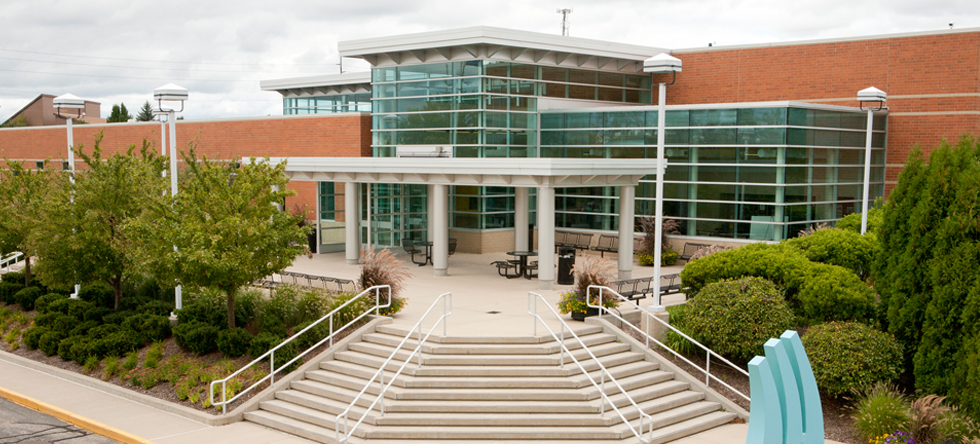Grand Valley State University

Find yourself pawing through a college dumpster on a nippy November morning and you might reasonably conclude that your career had taken a turn for the worse. But Dan Broersma was right where he wanted to be.
An environmental health and safety specialist at Herman Miller, Broersma was taking a few hours off to help out a neighbor—the Holland, Michigan, regional campus of Grand Valley State University.
It's not just that Broersma volunteered for the dumpster dive; he actually suggested it—though he prefers to refer to the activity as an “audit.” His task? To assess what students were throwing out so he could better advise the college about what could be recycled.
Broersma had performed similar audits at Herman Miller to bolster recycling efforts that all but eliminated trash from manufacturing lines. “If it worked for Herman Miller,” he says, wiping his hands on his coveralls, "why not for Grand Valley?"
GREEN TEAM
The decision to scrutinize Grand Valley's trash was made by the campus Green Team, a group of students, faculty, and staff that meets monthly to champion sustainability. Broersma is practically a charter member, having been invited to join after attracting attention for a green lifestyle column he once wrote for the local newspaper.
"We're only two miles from Herman Miller headquarters, so we're well-aware of their environmental leadership," says Lisa Miller, director of Grand Valley’s Meijer Campus in Holland. "Dan helps us explore best practices—'this is how Herman Miller does it; could something similar work for Grand Valley?'"
Even before forming a Green Team, the campus was no stranger to sustainability. It conserves water with native landscaping, conserves energy with efficient lighting, and buys only recycled paper. What’s more, several faculty members teach paper-free courses—all assignments, tests, and readings are online.
But rummaging through the dumpster? That's an idea that never came up until Broersma came aboard. So it was that he and fellow green teammate Anne Marie Fauvel, an affiliate professor specializing in environmental science, found themselves taking a dive; the Holland campus operates out of a single building, so it has just the one dumpster.
What did they discover? "About 90 percent of the garbage could have been recycled," Broersma says.
Grand Valley decided to borrow a page from Herman Miller by implementing a strategy that gives students, faculty, and staff little choice but to recycle. Trash cans have been removed from every classroom and office in the building. Instead, four recycling centers have been set up with four bins each—one for paper; one for plastic, glass, and metal; one for compostable waste; and one for the landfill.
Students simply recycle as they go about their day, filling the appropriate bins while traveling between classes.
“There’s a bit of peer pressure involved with the centralized approach,” Broersma admits. “People are more likely to do the right thing if they know others are watching. Plus, it creates a sense of common purpose that can be contagious.”
Faculty and staff also use the recycling centers, but are issued small paper bags to fill up in their offices and empty into the bins as necessary, usually at the end of each day. “It’s not practical for professors to walk to a recycling center every time they have a sticky note or banana peel,” Miller says. “And when they’re ready for a new bag, they just compost the old one.”
After six weeks, Broersma and Fauvel conducted another audit to determine if the new recycling program was having the desired impact. It sure was: “A dramatic improvement,” Broersma reports. “This time only about 20 percent of the landfill-bound trash in the dumpster could have been recycled.”
TRIPLE BOTTOM LINE
Miller attributes the program’s quick success partially to the strategy of taking trash cans out of the equation. “It makes recycling seem like the only way to go, not just a nice thing to do.” Even more important, she says, was Broersma’s suggestion to hit the triple bottom line by looking beyond the environmental benefits of recycling to the social and economic impact as well.
Grand Valley did so by partnering with a nearby rescue mission that operates a recycling center to provide job skills and help fund its programs.
“Dan always encourages us to ask the next question—in this case, ‘who benefits from your recycling?’” Miller says. “Because our recyclables are now helping a local nonprofit, students seem more eager to ensure that the bins are brimming.”
The economics also make sense for Grand Valley—more recyclables means less trash, means fewer pickups, means a smaller bill.
Now that Grand Valley’s regional campus has sorted out its new approach to waste management, Broersma is helping look into the possibility of trying something similar at the 24,000-student main campus in Allendale, Mich.
Says Lisa Miller about Herman Miller: “We’re always looking to get greener—and we’re fortunate to be able to tap into a resource that can give us ideas.”
Company Informations:
Le Office Furniture Manufacturer
www.letbackrest.com
Address: No.12, Nanhua Road, LongJiang ,Shunde,Foshan, Guangdong, China (Mainland)
Email: sale@letbackrest.com
skype: kinmai2008

